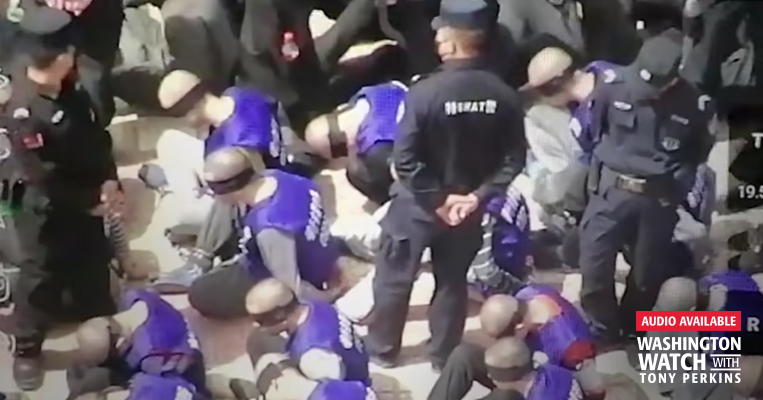They sat in rows — hundreds of them — heads freshly shaved. The men are blindfolded and hunched over, their hands tied tightly behind their backs. Close to tears, Omerbek Bikali looks at the footage — shot at a train station during another Uyghur round-up — and becomes overwhelmed. “That used to be me,” he says quietly. “I cannot forget.”
He is one of the fortunate ones. Of course, there was probably a time when Omerbek wouldn’t have considered months of torture, suffering, and uncertainty “fortunate.” But in China, where electric fences and high walls hide a world of pain, the saying goes, “If you enter a camp, you never come out.” Amanzhan Seiit did. But watching the video, shot by a drone over the Xinjiang province, he shudders. “I know what the prisoners are thinking,” he says — because he was one of them. “They don’t know where they’re being taken or if they’ll be shot dead. It’s terrifying.”
For the millions of Uyghurs in China’s concentration camps, being kidnapped, having hoods put over their heads, and being driven hours away from their families was just the first clue that their world was about to change. The interrogations, beatings, gang rapes, electrocutions, drug injections, and organ harvestings were the other.
Thousands of miles away, the case that’s been building after months of surveillance videos, survivor testimonies, drone pictures, and leaked Chinese documents has reached its boiling point. “This is not a ‘terrible secret,'” the Washington Post insists, like how little the West knew about the Final Solution when it occurred. The world cannot say it didn’t know. And in the U.S., it cannot say it didn’t act.
Tuesday, the House, in almost complete unanimity, sent a powerful message to China that America will not stand idly by while the regime brutalizes and exterminates its own people. By a 407-1 vote, both parties stood in solidarity with the millions of Uyghurs and other religious minorities forced to walk China’s blood-soaked trail of genocide. Under the act, the monsters responsible for these camps would be sanctioned and new bans on the sale of U.S.-made goods to state agents would inflict fresh pain on the country’s economy.
“It’s important to give the administration tools to hold Beijing accountable for what it’s doing,” Senator Josh Hawley (R-Mo.) told listeners on “Washington Watch.” “The bill in the House and the Senate version would give the administration the ability to stand up to this. And it also expresses the sense that the United States Congress [refuses to allow this] to happen.” It all goes hand-in-hand, he explains, with the pushback America’s led on Hong Kong. “[I]t’s vital to say to Beijing that oppressing your own people, that stamping out faith, that going after [religious] people and ethnic minorities is not permissible. We won’t allow it… And China’s desire to dominate the world is not something we’re going to stand by and watch happen.”
Even President Trump, who’s knee-deep in trade talks, knows that protecting innocent people is more important than negotiating better tariffs with the devil. “It’s great,” Senator Hawley agreed, “to have an administration that is willing to confront China and… actually stand up and say, ‘We are not going to allow you to continue to take our jobs, to steal our property, and run roughshod over the things we value most like religious freedom, like freedom of the press, freedom of assembly’ — things that they want to deny Hong Kong, for instance…”
Despite China’s threat that America will “pay” for interfering, the president continues to keep human rights and religious freedom issues at the forefront. And for once, the House is standing with him.
“Beijing is always threatening. They’re always saber rattling. But the truth is,” Hawley reminds everyone, “we’re the ones in the driver’s seat. China needs our supply chains. They need our investment. They need our trade. They are not in a position ultimately to stand up to us. Now… Beijing wants to dominate the Asian region [first], and then they want to dominate the whole world…. And we’ve given too much ground over the years. This is part of why we need to stand up now. But we should not listen to a thing that Beijing says. We need to go forward and stand up for our principles and keep the pressure on China.”
Make no mistake, Senator Hawley said, “We’re in for a long struggle here with China. We need to be realistic. They are a threat to us… [But] we’re starting here finally to show some strength — and we’ve got to keep it up.”
















